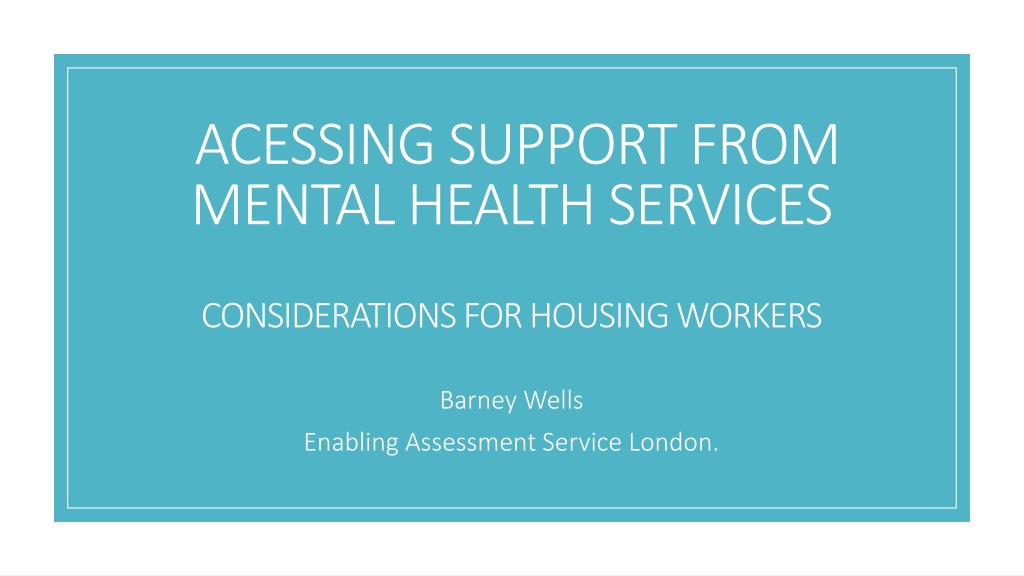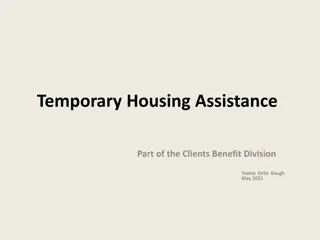Supporting Housing Workers in Accessing Mental Health Services
Offering reflections and advice on supporting individuals in accessing mental health services, this resource highlights the importance of quality conversations, research in advance, and adapting roles based on project needs. Emphasizing kindness and thoughtfulness, it provides practical guidance for housing workers in navigating support for those experiencing mental health challenges.
Download Presentation

Please find below an Image/Link to download the presentation.
The content on the website is provided AS IS for your information and personal use only. It may not be sold, licensed, or shared on other websites without obtaining consent from the author. Download presentation by click this link. If you encounter any issues during the download, it is possible that the publisher has removed the file from their server.
E N D
Presentation Transcript
ACESSING SUPPORT FROM MENTAL HEALTH SERVICES CONSIDERATIONS FOR HOUSING WORKERS Barney Wells Enabling Assessment Service London.
Written Guidance https://www.homeless.org.uk/working-with-mental- health-services
- Reflections and advice on how best to support someone you are working with in accessing mental health services What I will cover - Where to go for additional guidance This is based on my experiences as mental health social worker involved with homeless services for many years
Its the quality of It s the quality of the conversation the conversation that counts that counts Service user Colleagues Over professionals Finding ways to improve this and tackle barriers which might diminish Over-arching theme?
What I wont cover Details of exact pathways and processes - These vary from area to area attendees today are from too many places, plus things change
Research, in advance. Internet is useful, don t leave it there. Plan, clarify, discuss agree Speak with colleagues, GPs, commissioners. Have information available check that its up to date before you rely on it Possible to identify a point of contact in Possible to identify a point of contact in local statutory services? local statutory services?
Your appropriate role is going to vary, because of the nature of your post and the project A keyworker in a high support project on a mental health pathway is going to be involved in a different way to a floating support worker in a more general needs project As a worker from a housing setting But don t let your role alone to someone who may be experiencing mental health difficulties alone define how you respond Being kind and thoughtful and, where possible, making time is always going to be the best starting point
Housing! Being there and helping with small practical problems Value what you might bring Allowing time for people to talk about what they want or what might be bothering them Supporting people to register with a GP and giving information about services they can self- refer to may be exactly what someone wants and be the important empowering act you can take Panicking and handing over leaflets or talking immediately about process when someone wants to talk to you you may not be helfpful
Talking with colleagues including regular supervision Look after yourself Discuss your decisions with colleagues Support your colleagues in their decision making Reflective practice Balancing work with rest of life
If someone does want to talk to you about their mental health Remind them about your role, the extent and limits of this and what this means, for example in who you would share information with Let them know how long you have got and if you don t feel comfortable or safe Don t struggle to come up with answers or solutions but do suggest things that you could do or could find about Ask them if they felt this way before and what has or hasn t helped Don t avoid asking about risk don t rush to ask about risk Explore with them whether you can help them access support and how they feel about doing this Don t over sell what mental health services might offer, but also say if you think it is important and why
If someone doesnt want to talk to you about their mental health Respect this! But if you are concerned about their mental health, their welfare or their impact on others don t ignore it either Discuss with colleagues. Consider risk and your duties if you do feel that you need to act consider how you might communicate this with the person and give them another opportunity to talk
Mental Capacity Mental Capacity Act 2005 - Introduced to help protect everyone involved in situations where someone is, temporarily or more permanently, unable to make a particular decision for themselves at a particular time. If you think someone might have mental health issues and they are unable to make a decision themselves because of this it is important that you consider (and evidence) how this happening applying the test that is in the act Even if you establish that someone lacks capacity you still shouldn t take a decision on their behalf unless you also establish (and evidence) why it needs to be made now and why it is in their best interest. https://www.homeless.org.uk/sites/default/files/site- attachments/Using%20the%20Mental%20Capacity%20Act%202018.pdf https://www.pathway.org.uk/resources/learning-resources/mental-health-resource/
Dont stop thinking about alternative ways of understanding or approaching a situation Examples: Getting so caught up with thinking about mental capacity that you stop engaging with someone Use different frameworks! Not looking at other responsibilities, eg health and safety How does the person themselves understand what s going on? Different explanatory models rooted in culture. Acknowledge where you are coming from.
May know the person Should have background information GPs (primaycare) May be able to offer direct treatment Will have referral rights to secondary mental health services Have influence and authority over the shape of mental health services
May not know the person May not be able to offer significant time -To see the person -To consider all options May not have a good understanding of someone s social situation GPs Can you support the GP to offer a better service to the person you are working with? Would they agree to you attending with them? Writing something with them? Communicating directly?
Initial referral Longer term support Secondary mental Health services Crisis/ Home treatment teams IAPT Specialist services Hospital Admission AMHP Duty Psychiatric Liaison Services
Primary Legislation passed by parliament: Mental Health Act 1983 (amended 2008). Mental Capacity Act 2005. Human Rights Act 1998. Care Act 2014. The Context of Decision Making Within Mental Health Services Codes of Practice. Case Law. Department of Health Guidance. Local Policies. Professional bodies values. Budget Constraints. Staff turnover. Re organisations.
Referrals to secondary mental health services Varies between areas - Some encourage self-referrals. How can you support this? - It may be appropriate for you to make a referral
Name, date of birth, last known address, current location, how long they have been there Information about information sharing GP details and recent appointments Medical history (as known to you) What to include and what to prepare? o Medication, and are they taking it o Allergies and other medical conditions o Risk to self or others o Drug / alcohol use o Previous treatment if known Your concerns Your level of support Level of urgency
Accurate and Justified - Language to use Avoid generic terms support instead be specific No need to use medical terminology or jargon better to use plain English that conveys why you are concerned
https://www.homeless.org.uk/working-with- mental-health-services Homeless Link guidance Appendix 1 - What to include for an effective referral Appendix 2 - Two case studies
Substance use related Why referrals may be rejected Conditions that are felt to need a form of engagement that the person may not be ready for People who are felt to already have appropriate treatment or support - Can an assessment still be helpful?
Building Partnerships and Improving the quality of the conversation Housing and mental health services -How good is the understanding of each others remits scope and limitations? remits, - Can you build a reputation and relationship? -Can you reframe the conversation?

























